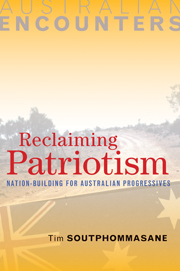Book contents
2 - Liberal patriotism and an Australian tradition
Published online by Cambridge University Press: 05 May 2010
Summary
The words ‘liberal’ and ‘patriotism’ do not usually go together. More often than not, patriotism is regarded as something distinctly illiberal. The great Russian writer Leo Tolstoy regarded patriotism as an immoral sentiment that encourages an exclusive concern for the well-being of one's own people. Motivated by a blind love of country, patriots pursue the good of their own nation at the expense of every other. For Tolstoy, patriotism meant one thing and one thing only – war: ‘Seas of blood have been shed over [patriotism]; and will yet be shed for it, unless people free themselves of this obsolete relic of antiquity.’ Tolstoy finds himself in good company. Albert Einstein referred to national pride as ‘an infantile disease’, as ‘the measles of mankind’. Philosopher Isaiah Berlin similarly believed that an inflamed national consciousness encouraged ‘the elevation of the interests of the unity and self-determination of the nation to the supreme value before which all other considerations must, if need be, yield’. How does one argue against the cumulative wisdom of such giants as Tolstoy, Einstein and Berlin?
The Australian historical experience suggests that Australians probably cannot claim immunity from the dangers of national pride and ethnic chauvinism. The pallid ghost of White Australia continues to haunt the national story. Nevertheless, it seemed for a while that Australia had managed to shake off its past.
- Type
- Chapter
- Information
- Reclaiming PatriotismNation-Building for Australian Progressives, pp. 35 - 61Publisher: Cambridge University PressPrint publication year: 2009



